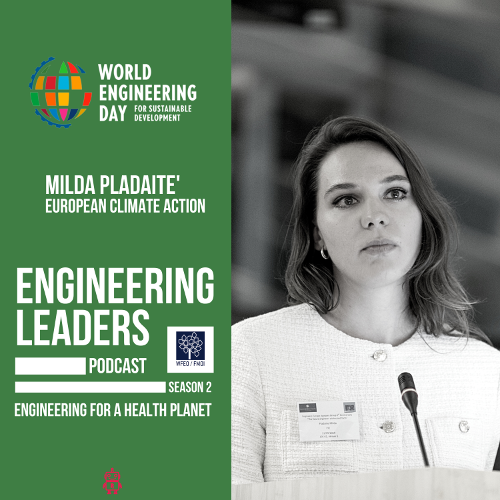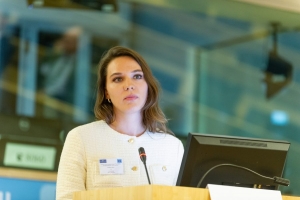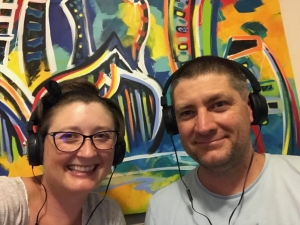See all the episodes of the Engineering Leaders Podcasts
 Digitisation and green transition are two key engineering issues in Europe. This episode Mel & Dom speak to Young Engineer/Future Leader Milda Pladaité about the trends and issues she is seeing in Europe. She discusses that one of the key issues being experienced is the shortage of skilled engineers to help enable Europe to achieve its goals.
Digitisation and green transition are two key engineering issues in Europe. This episode Mel & Dom speak to Young Engineer/Future Leader Milda Pladaité about the trends and issues she is seeing in Europe. She discusses that one of the key issues being experienced is the shortage of skilled engineers to help enable Europe to achieve its goals.
About Milda Pladaité
 Milda Pladaitė is a civil engineer from Lithuania, she graduated civil engineering at the University of Southampton and worked on construction and infrastructure projects.
Milda Pladaitė is a civil engineer from Lithuania, she graduated civil engineering at the University of Southampton and worked on construction and infrastructure projects.
She is a Blue Book trainee at the European Commission in Brussels, Institution of Civil Engineers representative to WFEO Young Engineers Future Leaders Committee and a member of WFEO Action Group on COP 26, where she set-up a working group on SDG 13. Aim of this work is to contribute to the sustainable development of countries by deploying WFEO young engineers’ work in the climate action.
About Ramaley Media
 Melanie & Dominic De Gioia, from Ramaley Media, are also the hosts of the podcast Engineering Heroes.
Melanie & Dominic De Gioia, from Ramaley Media, are also the hosts of the podcast Engineering Heroes.
Dominic is a mechanical engineer and the Director of a multi-disciplinary engineering firm in Sydney, Australia.
Melanie is the Director of Ramaley Media, a specialised media company promoting STEM. She is the Producer of Engineers Australia’s podcast, Engineering Heroes and is the project manager at The Warren Centre for Advanced Engineering, within the University of Sydney.
Transcript
This is a “close” copy of the words that were spoken during Ming-Ming’s interview
It is not 100% accurate.
Intro
Welcome to the WFEO’s podcast, Engineering Leaders. This is season 2, especially made to promote World Engineering Day, engineering for a healthy planet.
Your hosts are Melanie & Dominic De Gioia.
Our guest today is speaking to us from Europe. And in our conversation she mentions that there are 2 key trends of focus in Europe. They are digitisation and a green transition.
She says that while digital is an issue, it is also an area of great opportunity, allowing sectors to use digitisation to become more efficient. And as for going green … this is at the heart of everything Europe is doing.
Our guest today is Milda Pladaitė, a civil engineer from Lithuania, but now living in Belgium Brussles.
She graduated civil engineering at the University of Southampton and worked on construction and infrastructure projects.
Currently Milda is a Blue Book trainee at the European Commission in Brussels. She is also the Institution of Civil Engineers representative to WFEO Young Engineers Future Leaders Committee and is a member of WFEO Action Group on COP 26. She is responsible for setting up a working group of engineers focused on SDG 13 – Climate Action.The aim of this working group is to contribute to the sustainable development of countries by deploying WFEO young engineers’ to do work on climate action.
Mel: Milda grew up in Vilnus Lithuania and is half Lithuanian and half Russian. In school she was mainly interested in literature and history, not at all any STEM subjects. However in high school she says she got attracted to engineering because it sounded interesting and challenging. Some of her friends were doing the STEM subjects, and when she attended an open day at university it really confirmed her new direction….
(00:00:00) Milda: once I went to visit day at the university, I really liked university. I liked to what we were studying and I also wanted to do the same.
(00:00:09) Mel or Dom: (00:00:09) So What are some of the key issues in regards to engineering that you’re seeing at the moment in your region?
(00:00:15) Milda: In Europe. Do you mean trends we have… is digital and green transition. And one of the main challenges is the lack of up-skilled engineers who could provide with this transition.
(00:00:32) Mel or Dom: (00:00:32) okay. So, so there are big engineering shortages throughout Europe. Well obviously it’s something that we experience here in Australia, so it’s, it’s not just local as a, it’s a global problem. Is it?
(00:00:43) Milda: I think so. Definitely. And, uh, from what I understand the same in Africa, so probably is global. Yeah.
(00:00:51) Mel or Dom: I know there’s a shift towards a lot more environmental initiatives from, uh, the people like the groundswell from just the general populace. But are you seeing the governments get on board in regards to more environmental engineering projects as well.
(00:01:08) Milda: It’s hard to say what we are getting on board in particular for, with engineering projects, which are more green. But definitely in general the trend is very green, with a European green deal, it’s in the heart of everything Europe will be doing. And yes, engineering forms a part of it, a very important part in helping to achieve those targets which government institutions set.
(00:01:37) Mel or Dom: Just to go back to the key issues. You mentioned the digital one. What, what do you mean by that? As an issue?
(00:01:44) Milda: And well, it might be an issue, but there’s also an opportunity. So it’s probably as you know, that digitalization is quite a trend. And that affects also engineering, for example, I am a civil engineer. So, this problem of digitalization is very relevant to construction industry and this meaning that digitalization and that industry would help the sector to become more efficient.
(00:02:10) Mel or Dom: Okay. So it comes down to efficiencies and, and such. And so this year is World Engineering Day , engineering for a healthy planet. That’s the theme. And as engineers, what do you feel is a priority to achieve that healthy planet goal?
(00:02:28) Milda: And for the healthy planet to the main focus should be on climate emergency and engineers are doing great work. But one of ’em main things flow improvement is that we could work more closely with policymaking institutions to formally help each other to reach and set the targets who could help achieve a healthy planet.
(00:02:53) Mel or Dom: It’s something that gets talked about a lot on our podcast that engineers need to be sitting at the table when these decisions are being made. Is that something that you’re seeing more of? Are there more engineers getting involved in, in having those discussions with politicians to sort of drive that change?
(00:03:13) Milda: Well, I don’t have so much experience, but from what I see, and from what I hear from my more senior colleagues, but yes, in general … so many engineers who are involved in politics in particular in Europe, there are other cases in other countries. But in Europe, in general, um, in policymaking, there aren’t many engineers and that probably is not so good.
(00:03:43) And it would be more efficient if it would be more.
(00:03:47) Mel or Dom: It would be nice if engineers are at those tables. Yeah, it definitely would be because there are such critical decisions that need to be made. And so it really does lend itself to having that scientific background and that technical knowledge to be able to address them.
(00:04:04) So you mentioned that climate change was a key priority to ensuring a healthy planet.
(00:04:09) What are you doing specifically in relation to those climate change issues these days as part of your work?
(00:04:16) Milda: As, um, part of my work. I’m a member the World Federation of Engineering Organizations committee for Young Engineers, Future Leaders. And in that committee, I have set up a working group on SDG 13, which is Climate Action. And the aim of this group is to bring together national initiatives and the young engineers from various backgrounds and various countries to work together and share the knowledge and challenges they face.
(00:04:50) And most importantly, to support each other, to contribute and reach the Paris agreement goals and United nations targets.
(00:04:59) Mel or Dom: (00:04:59) So what made you choose to take part in that with WFEO group for climate action? What inspired you to, to involve yourself with that?
(00:05:07) Milda: It is because it’s a global issue. And also there’s a lot of opportunity which currently is untapped. But there are many great initiatives with engineers where Young engineers are working locally, but we do not share, that knowledge and expertise with the young engineers from other countries.
(00:05:29) So in general, it’s just about promoting that share of knowledge between continent, between the countries.
(00:05:36) Mel or Dom: Great to actually be able to recognize that there’s a problem out there and that there’s an ability. There’s something out there for you to actually be able to get involved in and take part in an actually. Make a difference across multiple countries. So it really ties in that. Uh, what is it? UN SDG 17 partnerships for goals.
(00:05:57) So sharing that, uh, partnerships across countries and things like that towards a single goal
(00:06:03) Milda: Yes indeed.
(00:06:04) Mel or Dom: with the lead up to world engineering day for a healthy planet. What does world engineering day mean to you?
(00:06:11) Milda: I think it’s a great initiative. It tackles the challenges we have, and which we discussed earlier. It’s that we need more engineers. We need more engineers to tackle the future demands. So the future challenges. So World Engineering Day raises the profile of engineering and brings engineers from different countries together for the same goal of a healthy planet.
(00:06:35) Mel or Dom: So this year is World Engineering Day is going to be such a great accomplishment because we’ve had over a year now to get used to what could be and about, you know, promoting engineers everywhere.
(00:06:47) So yeah, I know Dom and I really looking forward to it as well. It could be interesting to see just, what sorts of things all the various engineers around the world can bring to World Engineering Day. Their help to, to rise the profile out there for all engineers and hopefully encourage more younger people to, to get involved in and look to that as a potential career in the future.
(00:07:09) Thank you so much for joining us today.
(00:07:12) Thank you so much. It was great speaking with you.
(00:07:14) Milda: Thank you. It was same for me.
